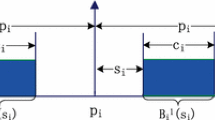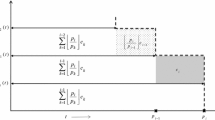Abstract
The schedulability analysis of real-time systems (even on a single processor) is a very difficult task, which becomes even more complex (or undecidable) when periods or deadlines become uncertain. In this work, we propose a unified formalism to model monoprocessor schedulability problems with several types of tasks (periodic, sporadic, or more complex), most types of schedulers (including \(\mathsf {EDF}\), \(\mathsf {FPS}\) and \(\mathsf {SJF}\)), with or without preemption, in the presence of uncertain timing constants. Although the general case is undecidable, we exhibit a large decidable subclass. We demonstrate the expressive power of our formalism on several examples, allowing also for robust schedulability.
This work is partially supported by the ANR national research program PACS (ANR-14-CE28-0002).
Access this chapter
Tax calculation will be finalised at checkout
Purchases are for personal use only
Similar content being viewed by others
Notes
- 1.
As this definition is a contribution of this paper, it would better fit outside of the preliminaries section; however, it is convenient to define it first so as to then define task automata, and (parametric) timed automata in a straightforward manner.
- 2.
In the literature, TAs are often defined using integer constants in guards and invariants; it is well-known that using rationals preserves decidability results, as rationals can be translated to integers using an appropriate constants rescaling.
- 3.
Sources, binaries, models and results are available at imitator.fr/static/FMICS17.
References
Abdeddaïm, Y., Maler, O.: Preemptive job-shop scheduling using stopwatch automata. In: Katoen, J.-P., Stevens, P. (eds.) TACAS 2002. LNCS, vol. 2280, pp. 113–126. Springer, Heidelberg (2002). doi:10.1007/3-540-46002-0_9
Alur, R., Dill, D.L.: A theory of timed automata. Theor. Comput. Sci. 126(2), 183–235 (1994)
Alur, R., Henzinger, T.A., Vardi, M.Y.: Parametric real-time reasoning. In: STOC, pp. 592–601. ACM (1993)
André, É.: What’s decidable about parametric timed automata? In: Artho, C., Ölveczky, P.C. (eds.) FTSCS 2015. CCIS, vol. 596, pp. 52–68. Springer, Cham (2016). doi:10.1007/978-3-319-29510-7_3
André, É., Fribourg, L., Kühne, U., Soulat, R.: IMITATOR 2.5: a tool for analyzing robustness in scheduling problems. In: Giannakopoulou, D., Méry, D. (eds.) FM 2012. LNCS, vol. 7436, pp. 33–36. Springer, Heidelberg (2012). doi:10.1007/978-3-642-32759-9_6
André, É., Lipari, G., Sun, Y.: Verification of two real-time systems using parametric timed automata. In: WATERS (2015)
Bagnara, R., Hill, P.M., Zaffanella, E.: The parma polyhedra library: toward a complete set of numerical abstractions for the analysis and verification of hardware and software systems. Sci. Comput. Program. 72(1–2), 3–21 (2008)
Bérard, B., Haddad, S., Jovanović, A., Lime, D.: Parametric interrupt timed automata. In: Abdulla, P.A., Potapov, I. (eds.) RP 2013. LNCS, vol. 8169, pp. 59–69. Springer, Heidelberg (2013). doi:10.1007/978-3-642-41036-9_7
Bouyer, P., Markey, N., Sankur, O.: Robustness in timed automata. In: Abdulla, P.A., Potapov, I. (eds.) RP 2013. LNCS, vol. 8169, pp. 1–18. Springer, Heidelberg (2013). doi:10.1007/978-3-642-41036-9_1
Cassez, F., Larsen, K.: The impressive power of stopwatches. In: Palamidessi, C. (ed.) CONCUR 2000. LNCS, vol. 1877, pp. 138–152. Springer, Heidelberg (2000). doi:10.1007/3-540-44618-4_12
Cimatti, A., Palopoli, L., Ramadian, Y.: Symbolic computation of schedulability regions using parametric timed automata. In: RTSS, pp. 80–89. IEEE Computer Society (2008)
Fang, B., Li, G., Sun, D., Cai, H.: Schedulability analysis of timed regular tasks by under-approximation on WCET. In: Fränzle, M., Kapur, D., Zhan, N. (eds.) SETTA 2016. LNCS, vol. 9984, pp. 147–162. Springer, Cham (2016). doi:10.1007/978-3-319-47677-3_10
Fersman, E., Krcál, P., Pettersson, P., Yi, W.: Task automata: schedulability, decidability and undecidability. Inf. Comput. 205(8), 1149–1172 (2007)
Hune, T., Romijn, J., Stoelinga, M., Vaandrager, F.W.: Linear parametric model checking of timed automata. J. Logic Algebr. Program. 52–53, 183–220 (2002)
Jovanović, A., Lime, D., Roux, O.H.: Integer parameter synthesis for timed automata. IEEE Trans. Softw. Eng. 41(5), 445–461 (2015)
Miller, J.S.: Decidability and complexity results for timed automata and semi-linear hybrid automata. In: Lynch, N., Krogh, B.H. (eds.) HSCC 2000. LNCS, vol. 1790, pp. 296–310. Springer, Heidelberg (2000). doi:10.1007/3-540-46430-1_26
Norström, C., Wall, A., Yi, W.: Timed automata as task models for event-driven systems. In: RTCSA, pp. 182–189. IEEE Computer Society (1999)
Sun, Y., Soulat, R., Lipari, G., André, É., Fribourg, L.: Parametric schedulability analysis of fixed priority real-time distributed systems. In: Artho, C., Ölveczky, P.C. (eds.) FTSCS 2013. CCIS, vol. 419, pp. 212–228. Springer, Cham (2014). doi:10.1007/978-3-319-05416-2_14
Author information
Authors and Affiliations
Corresponding author
Editor information
Editors and Affiliations
Rights and permissions
Copyright information
© 2017 Springer International Publishing AG
About this paper
Cite this paper
André, É. (2017). A Unified Formalism for Monoprocessor Schedulability Analysis Under Uncertainty. In: Petrucci, L., Seceleanu, C., Cavalcanti, A. (eds) Critical Systems: Formal Methods and Automated Verification. AVoCS FMICS 2017 2017. Lecture Notes in Computer Science(), vol 10471. Springer, Cham. https://doi.org/10.1007/978-3-319-67113-0_7
Download citation
DOI: https://doi.org/10.1007/978-3-319-67113-0_7
Published:
Publisher Name: Springer, Cham
Print ISBN: 978-3-319-67112-3
Online ISBN: 978-3-319-67113-0
eBook Packages: Computer ScienceComputer Science (R0)




